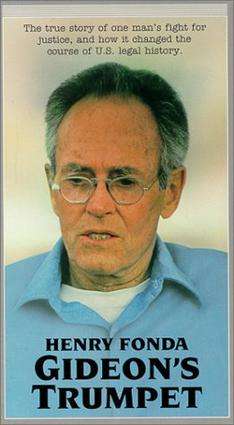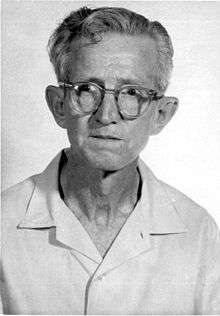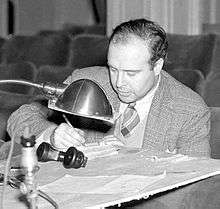Gideon's Trumpet (1980 film)
Gideon's Trumpet is a 1980 American made-for-television historical drama film based on the biographical book of the same name written by Anthony Lewis.[1] The film depicts the historical events before and during the 1963 United States Supreme Court case of Gideon v. Wainwright that brought the right of an attorney to criminal defendants who could not afford it and did not meet special requirements to get one for free.[2] After the ruling, the implementations of the case have been made several impacts publicly, nationally, and even globally.[3][4][5][6][7][8]
| Gideon's Trumpet | |
|---|---|
 VHS cover | |
| Genre | Historical Drama |
| Based on | Gideon's Trumpet by Anthony Lewis |
| Written by | David W. Rintels |
| Directed by | Robert Collins |
| Starring | Henry Fonda José Ferrer John Houseman Fay Wray Sam Jaffe Dean Jagger Nicholas Pryor |
| Music by | Joseph Weiss |
| Country of origin | United States |
| Original language(s) | English |
| Production | |
| Executive producer(s) | John Houseman |
| Producer(s) | David W. Rintels |
| Cinematography | Don H. Birnkrant |
| Editor(s) | Frank Bracht |
| Running time | 104 minutes |
| Production company(s) | Hallmark Hall of Fame Productions |
| Distributor | Worldvision Enterprises |
| Release | |
| Original network | CBS |
| Original release | April 30, 1980 |
The film was distributed by Worldvision Enterprises, and it premiered on April 30, 1980 on CBS-TV as a Hallmark Hall of Fame film. The feature stars Henry Fonda as the main character of Clarence Earl Gideon, José Ferrer as Abe Fortas, and John Houseman as the Chief Justice of the United States. Other notable actors and actresses involved in the production of the film were Fay Wray, Sam Jaffe, and Dean Jagger. The film was directed by Robert L. Collins. It was produced and written under the direction of John Houseman and David W. Rintels.[9][10] The film was recognized and nominated for three Primetime Emmy Awards the same year it premiered on television on September 7, 1980.[11]
Plot
The story starts with the title character Clarence Earl Gideon (played by Henry Fonda) looking into the camera and remarking how he would try to give a full account of his situation, even though he may not remember everything. The film shifts to a bar in Panama City, Florida in the summer of 1961 where several people notice the pool room was broken into and money stolen from the register. This leads to the arrest of Gideon, who was seen using a nearby payphone the same night that the pool room was broken into.

On the day of his trial, he asks for a defense attorney to be assigned to represent him because he does not have much money, but Judge Robert McCrary (played by Richard Mackenzie) refuses his request even though Gideon claims that it is his right to have an attorney in his trial. After the cross-examinations of witnesses against and for Gideon and much deliberation from the jury based on how Gideon represented himself in the trial, Gideon is convicted and sentenced to five years in state prison. While there, Gideon often visits the prison's library, and researches how the law of the United States plays out, gaining support and reverence from his fellow inmates.
From all this research, he makes arrangements to write a writ of certiorari petition to the Supreme Court. The Chief Justice (played by John Houseman) and the other eight justices review other petitions before they come across Gideon's. Before they decide to follow through with his petition, the justices debate whether or not they can argue for a case where a right to an attorney is given to everyone, regardless of special qualifications. Gideon receives the letter stating that they have accepted to hear his case. In order to collect more information, Abe Fortas (played by José Ferrer) asks Gideon for a biography in order to see if he has any special circumstances. Once this personal information is received, Fortas soon realizes that Gideon does not match any special circumstances. Fortas goes to trial against the prosecutor, and wins the case so Gideon can be tried again, this time with an attorney.
While Gideon is disappointed by having to go through a retrial, he is given an excellent attorney in the area by the name of Fred Turner (played by Lane Smith). At the second trial, Gideon declares that the retrial was unconstitutional and falls under double jeopardy. Unfortunately for Gideon, the judge says that the retrial does not fall under double jeopardy and allows the re-trial to proceed. The prosecuting team gives their remarks and discussed matters in almost the same way they did at Gideon's first trial. Turner notes a credibility flaw in one of the main witnesses and receives more information from other individuals that had previously been questioned. Turner is able to shed some light on newly found evidence and other information in regards to what happened on the night of the robbery. After some time, the jury decides that Gideon is not guilty and released from prison. Gideon walks out of the courthouse, content and relieved.
As the camera pans out, a narrator reads the following quote by Robert Kennedy:
If an obscure Florida convict named Clarence Earl Gideon had not sat down in prison with a pencil and paper to write a letter to the Supreme Court; and if the Supreme Court had not taken the trouble to look at the merits in that one crude petition among all the bundles of mail it must receive every day, the vast machinery of American law would have gone on functioning undisturbed. But Gideon did write that letter; the court did look into his case; he was re-tried with the help of competent defense counsel; found not guilty and released from prison after two years of punishment for a crime he did not commit. And the whole course of legal history has been changed.[12]
Cast
- Henry Fonda as Clarence Earl Gideon
- José Ferrer as Abe Fortas
- John Houseman as Chief Justice
- Fay Wray as Edna Curtis
- Sam Jaffe as First Supreme Court Justice
- Dean Jagger as Sixth Supreme Court Justice
- Nicholas Pryor as Jacob
- William Prince as Fifth Supreme Court Justice
- Lane Smith as Fred Turner
- Richard McKenzie as Judge Robert McCrary
- Dolph Sweet as Charlie
- Ford Rainey as Second Supreme Court Justice
- David Sheiner as Abe Krash
- J. Patrick McNamara as Harris
- Les Lannom as Bobby Earl[13]
Anthony Lewis, the author of Gideon's Trumpet, also made a cameo role as a reporter in the ending scenes of the film.[2]

Historical background
Before Gideon v. Wainwright, there was a history of cases related to the right of counsel that were involved in criminal procedure in the United States.[2][14] During the time of the case, there was a political shift toward how much the federal government could control in regards to federal law, which is shown by the Warren Court.[7] In regards to how well the film depicts the case historically, the film does not mention the name of the Chief Justice, but the Chief Justice of the United States at that time was Earl Warren.[2][15] In the public recently, the case has differing opinions among many scholars into how well it is implemented.[3][4] In the United States, measures have been taken to ensure that the case could apply to the state laws and federal laws included in the United States Constitution.[6][5] Globally, the case has tried to make changes to their policies concerning the right to counsel, but the qualifications that determine the right of counsel still vary from country-to-country.[8]
Production
Production crew
In addition to directing Gideon's Trumpet, Robert Collins also made major contributions in the TV show, Serpico, and the 1979 version of Acts of Violence. David R. Rintels is also very active in the television film industry. He contributed to The Senator made in 1971, and Clarence Darrow ,which was worked on with Collins and John Houseman. Rintels also helped write Fear on Trial in 1976, from which he received three Gavel Awards.[1][10]
Filming
The prison scenes in the film were captured at the Men's Correctional Facility in Chino, California using prison inmates currently in the facility as extras. The director, Robert Collins, remarks of how difficult filming was with the prison inmates as extras as "by the time, [the production crew] made four takes, [the prisoners] were very unhappy." Collins has also remarked that he took special care in filming the prison scenes by making the prison scenes more "harsh" than the court scenes because he wanted to create a "contrast" in those scenes.[16] Fonda, who played the title character, also made some comments about how "fascinating" it was to play the role of Clarence Gideon, even though in his past productions he had not usually played similar roles.[17]
Reception
Release
On April 30, 1980, the day of the premiere, a New York Times newspaper article was released to notify potential viewers. In it, John J. O'Connor compliments the show by saying "The law and its intricacies are not the most promising subjects for compelling drama. But Anthony Lewis, a writer for The New York Times, demonstrated that complex arguments and legal briefs could indeed be absorbing in his 1964 book 'Gideon's Trumpet.' And tonight at 9 o'clock on CBS-TV, an adaptation by David W. Rintels of that book makes the same point with remarkable success."[18]
Just weeks earlier, the American Bar Association Journal released an article titled Blowing Gideon's Trumpet. Emmet Lavery highlights the producer when she writes "Rintels has won three Gavel Awards from the American Bar Association for his television productions."[1] In May 1980, Variety magazine reviewed the television show as it was recently named in the Hallmark Hall of Fame. The author summarized the film and remarked "As propaganda for an enlightened view of civil liberties, 'Gideon's Trumpet' offers, implicitly, a sharp indictment of the Burger Court's retreat from the kinds of decisions, like the one in Gideon case, that marked the Warren Court as a sharp defender of the rights of the individual."[9]
Critical response
The film has a rating of 55% on Rotten Tomatoes based on 329 user ratings. In 2007, one critic, David Cornelius, wrote "Nearly three decades since its initial broadcast, it still holds a place as a triumph of televised storytelling".[19] Additionally, IMDb rates it at a 7.2/10, the average of 903 reviews.[13]
Awards and honors
| Award | Category | Recipient | Result | Ref |
|---|---|---|---|---|
| Primetime Emmy Awards | Outstanding Drama or Comedy Special | John Houseman, David W. Rintels | Nominated | [11] |
| Outstanding Lead Actor in a Limited Series or a Special | Henry Fonda | Nominated | ||
| Outstanding Writer in a Limited Series or a Special | David W. Rintels | Nominated |
See also
- Clarence Earl Gideon
- Earl Warren
- Gideon's Trumpet (the book)
References
- Lavery, Emmet (March 1, 1980). "Blowing Gideon's Trumpet". American Bar Association Journal. 66: 326–327.
- Jacob, Bruce R. (July 1, 2014). "The Gideon Trials". Iowa Law Review. 99: 2059–2101.
- Marceau, Justin F. (June 2013). "Gideon's Shadow". The Yale Law Journal. 122 (8): 2482–2503. JSTOR 23528682.
- Mayeux, Sarah (January 2016). "What Gideon Did". Columbia Law Review. 116 (1): 15–103. JSTOR 43681848.
- "Divergent Formalities." Security and Privacy: Global Standards for Ethical Identity Management in Contemporary Liberal Democratic States, by John Kleinig et. al., ANU Press, 2011, 19–76.
- Wynne, Susan L. Indigent Defense in the United States: An Analysis of State Frameworks for Ensuring the Effective Assistance of Counsel, Sam Houston State University, Ann Arbor, 2017.
- Somin, Ilya (2017-12-31), "14. The Supreme Court of the United States: Promoting Centralization More Than State Autonomy", Courts in Federal Countries, University of Toronto Press, pp. 440–481, doi:10.3138/9781487511470-017, ISBN 9781487511470.
- Burke, Michael E. (April 2013). "Exporting Gideon". Human Rights. 39 (4): 17–21. JSTOR 24630073.
- Dempsey, John. "Gideon's Trumpet (Hallmark Hall of Fame)." Variety, 1 May 1980, 586.
- Buck, Jerry (April 27, 1980). "Filming 'Trumpet' Proved to Be a Tense Experience". Southern Illinoisan.
- Smith, Cecil (September 7, 1980). "Show Of The Week". Los Angeles Times.
- Kennedy, Robert (1963). "Clarence Earl Gideon v. Wainwright, U.S. Supreme Court, 1963: A Landmark in the Law". Division of Public Defender Services, State of Connecticut.
- Gideon's Trumpet (TV Movie 1980) - IMDb, retrieved 2019-04-04.
- Lewis, Anthony (1964). Gideon's Trumpet. New York: Vintage Books/Random House. pp. 115, 120–121. ISBN 9780679723127.
- Lewis, Anthony (1964). Gideon's Trumpet. New York: Vintage Books/Random House. pp. 38. ISBN 9780679723127.
- Buck, Jerry (April 27, 1980). "Fliming 'Trumpet' proved to be a tense experience". Southern Illinoisan.
- Kalter, Suzy (April 27, 1980). "At 74, Henry Fonda Is in the Prime Time of Life". The Kokomo Tribune.
- O'Connor, John (April 30, 1980). "TV, 'Gideon's Trumpet,' Landmark Rights Case". The New York Times.
- "Gideon's Trumpet". Rotten Tomatoes. Retrieved April 4, 2019.